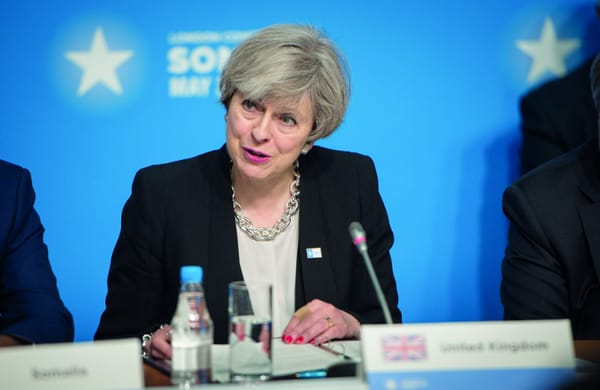The trial of Winston Churchill and the British Empire he helped to build
In films like Darkest Hour, Winston Churchill is whitewashed as an elder statesman whose warnings were ignored. It’s time we examine his imperialist legacy.

Carthage must be destroyed, the Roman Senator Cato the Elder decried at the end of all his speeches, irrespective of the original topic at hand. As a result of the tenacity of the war-mongering Roman elite, a once mighty civilization was reduced to rubble. Thus, if history teaches us anything, it is that consensus can be achieved by merely reinforcing any viewpoint repeatedly. The whitewashing of the crimes and odious views of Winston Leonard Spencer Churchill has been very successful due to the barrage of bipartisan and universal reverence given to him. This is a dangerous example of history being rewritten by the tide of adulation presented by numerous books and films – most recently Joe Wright’s Darkest Hour, in which Gary Oldman plays Churchill.
After watching Darkest Hour, one can not help but be impressed by Oldman’s performance and consequently fall prey to the reluctant hero image of Churchill that has been cultivated since 1945. The true legacy of Churchill, however, is far more complicated and requires honest introspection. One the most inaccurate scenes from the film shows Churchill riding the tube on his way to Parliament, and in the process, by talking to the average Brit, he gains the courage to oppose any notion of surrender. This would have been uncharacteristic of the man who once said, “the best argument against democracy is a five-minute conversation with the average voter”. While this harmless scene was added for cinematic effect, it nonetheless contained a dangerous rewriting of history, especially since one of the “average Brits” that Churchill interacted with was a black man of African descent. The real Churchill was a white-supremacist who fervently opposed any immigration to the UK by people of colour, making it unlikely that real Churchill would have ever treated a black man as an equal constituent, to whom he was accountable.
The purpose of this article is to bring forth an indictment of the high crimes and misdemeanours of one of history’s worst imperialists. Genocide, use of ‘weapons of mass-destruction’ against civilians, and being an ardent believer in racial superiority are only the tip of the iceberg.
“The Bengal famine killed over 3 million loyal citizens as a result of Churchill’s racist views”
However, before any of the lesser known travesties are examined, we need to address the biggest myth of all: Churchill having the foresight regarding the need to combat the evil of totalitarianism. While it is true that Churchill had come to realise the danger Hitler posed from the early years of the Third Reich, his zealot-like opposition to socialism meant he was a strong advocate for British neutrality during the Spanish Civil War. Because of this morally bankrupt policy, the fascist coalition of Mussolini and Hitler strengthened and propelled Franco to power. The silence towards the Blitzkrieg perpetrated on Barcelona and the other great cities of Spain was deafening. In fact, in the late 1920s, Churchill openly admired Mussolini’s brutal crackdown on communists by praising how “fascism has rendered a service to the entire world”. Churchill, as displayed by the political positions he took throughout his life, opposed Nazism not out of any consistent moral compass but instead to preserve the tyranny of the British Empire. While Churchill was waging war on behalf of the Poles and Czechs to restore their trampled rights, he was also systematically denying those very rights to the colonised world.
The aura of Churchill stems from the image of the underdog status Britain unfortunately gained when it stood alone in Europe fighting against the Nazis. However, the truth couldn’t be further from the fictitious image of little Britain standing alone. Britain was never alone during the war. The prime-ministers of “white” commonwealth nations of Australia, New Zealand, Canada, South Africa, and Rhodesia pledged their continued support even after the fall of France. However, the most astonishing acts of solidarity are found among those who were not privileged with the rights of equality and universal suffrage; those who were not the masters of their destinies, yet still volunteered to fight for democracy and freedom in Europe (those very rights which were denied to them). India alone contributed over 2.5 million volunteers to fight in the war, who were accompanied by their comrades from the Caribbean, Africa, the Middle East, and South East Asia.
“Churchill showed no remorse towards the historical injustices suffered by Native American people”
The likes of Mao and Stalin are correctly placed in the pantheon of brutal dictators alongside Hitler and Mussolini, for the mass-starvation they inflicted on their people. The legacy of the British Raj was catastrophic famines, none more so than the Bengal famine of 1943-44. These were not natural events, but direct consequences of callous policies. The Bengal famine killed over 3 million loyal citizens as a result of Churchill’s racist views regarding Indians – he ordered the export of more than 70,000 tonnes of grain out of India in July of 1943 to shore up reserves in Britain and for a disastrous campaign in Greece. In Churchill’s own words, “starvation of anyhow under-fed Bengalis is less serious than sturdy Greeks”. Churchill’s ambivalence towards the suffering of Indians was considered extreme , even by his contempories. When ardent imperialists like Leopold Amery – secretary of state for India – implored Churchill to act, his only response was “Indians breed like rabbits”, that they “are beastly people”, and asking “why isn’t Gandhi dead yet?” More troublingly, when conscience stricken leaders in Canada, Australia, and America offered to send grain to relieve the famine, Churchill declined in the fear that they may be sunk by Japanese submarines. How was this any different to Stalin’s Holodomor in the Ukraine?
It wasn’t just Indians that Churchill despised. He referred to Palestinian Arabs as “dogs” and showed no remorse towards the historiacl injustices suffered by Native-American and Aboriginal-Australian people. Churchill’s obscene racial views would be abhorrent to any fair-minded individual – yet they are always omitted in his countless portrayals in the media. The Atlantic Charter, which cemented the Anglo-American alliance, was signed with wildly different interpretation. To Franklin Roosevelt the commitment of “right to self-determination” extended to all of humanity, serving as the final nail in the coffin for the age of empire. However, Churchill maintained to his cabinet that this pledge only extended to the citizens of Europe, proclaiming “I have not become the King’s First Minister in order to preside over the liquidation of the British Empire.”
“Many of the problems facing the Middle East can be traced back as products of British Imperialism from Palestine to Iran”
Even if one were to be charitable and not level the charge of genocide but instead the milder accusation of criminal negligence in handling the Bengal famine, the Mau-Mau rebellion does not leave any room for ambiguity. After Churchill’s return to power in 1951, his government oversaw the suspension of habeas-corpus and the forced detention of 150,000 Kenyans – men, women and children – into concentration camps in which rape, castration, and electric shock torture were the norm. All this was done to protect the colonial apartheid regime. What was promised to have been left behind in Nuremburg continued under Churchill’s supervision. However, it should not have come as a surprise: after all Churchill was mightily impressed by the first ever concentration camps during the Boer War. The Geneva Protocol of 1928 which outlawed the use of chemical and biological weapons did not materialise in a vacuum. Poison gas continued to be in use in warfare after the First World War, once again with Churchill’s approval. Whilst serving as the Secretary of State for the Colonies in 1921 he expressed his desire to use “poisoned gas against the uncivilized tribes” and to provoke “terror” in order to subdue any resistance to British rule in Mesopotamia (modern day Iraq).
Churchill’s contempt for the people of the Middle East was groomed in his early years as a solider in the Anglo-Afghan War in the late 19th century. He would later write with a proud boast of how the British “destroyed the houses, filled up the wells, burned the crops, and broke the reservoirs in punitive devastation” to unleash terror on the the native Pashtun tribes.
Many of the problems facing the Middle East are still a direct product of British imperialism, from Palestine to Iran. After Churchill returned to power in 1951, the disastrous policies he advocated would ultimately produce the unintended consequence of establishing a rogue theocratic regime a generation later. In order to protect the interests of private British oil corporations, the CIA, with the urgings of British government, orchestrated the return to power of the brutal Shah of Iran in a coup against the secular and democratically elected leader of Iran, Mohammad Mosaddegh.
“The reality remains that in many of the former British colonies, Churchill is not revered as a liberator but derided as an unrepentent imperialist”
Churchill was consistently on the wrong side of history for most of the important issues of his time – his fierce opposition to the women’s suffrage movement, for example, was exemplified by him saying “nothing would induce me to vote for giving women the franchise”.
“History will be kind to me,” Churchill remarked to his war-time ally Joseph Stalin, “because I intend to write it”. Unlike the other two leaders of allied coalition, Roosevelt – who died in office weeks before the war would end – and Stalin, Churchill’s six volume, Nobel prize winning account of WWII would shape his enduring image as a wartime leader. And so Churchill was right: history has been very kind to him. Very little is ever written about the disastrous Norwegian Campaign of 1940, which was planned and executed by Churchill, but would result in Neville Chamberlin losing support and ironically propel Churchill’s rise to power.
It is important to note that, to his contempories, Churchill wasn’t particularly popular. Throughout the 1930s, due to his racist opposition to the Government of India Act, he was relegated as a political pariah. Had Churchill had a more enlightened view towards people of colour, his early warnings on Hitler might not have fallen on deaf ears. Interestingly, even after “leading” Britain to victory, he was given the “order of the boot” by the public in an overwhelming defeat in the 1945 general election. Churchill was a not a reconciliatory figure. He never expressed regret about his treatment of people of colour within the British empire. The universal admiration given to Churchill is synonymous with what Noam Chomsky calls the “manufacture of consent”. The reality remains that in many of the former British colonies, Churchill is not revered as a liberator, but is derided as a gross hypocrite, racist, and an unrepentent imperialist.








